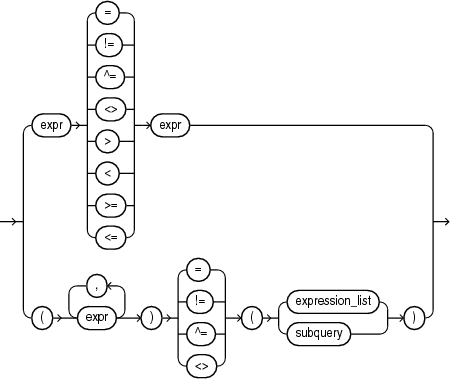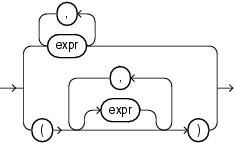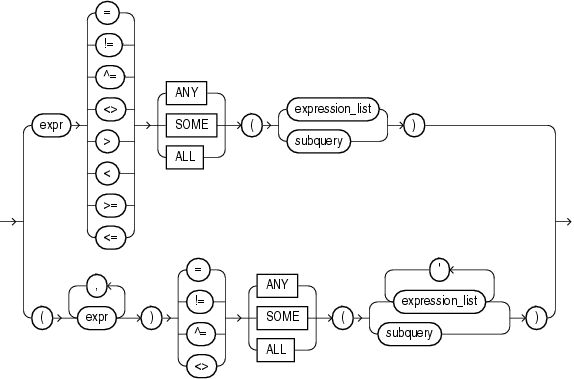Comparison Conditions
Comparison conditions compare one expression with another. The result of such a comparison can be TRUE, FALSE, or UNKNOWN.
Large objects (LOBs) are not supported in comparison conditions. However, you can use PL/SQL programs for comparisons on CLOB data.
When comparing numeric expressions, Oracle uses numeric precedence to determine whether the condition compares NUMBER, BINARY_FLOAT, or BINARY_DOUBLE values. Refer to Numeric Precedence for information on numeric precedence.
When comparing character expressions, Oracle uses the rules described in Data Type Comparison Rules. The rules define how the character sets of the expressions are aligned before the comparison, the use of binary or linguistic comparison (collation), the use of blank-padded comparison semantics, and the restrictions resulting from limits imposed on collation keys, including reporting of the error ORA-12742: unable to create the collation key.
Two objects of nonscalar type are comparable if they are of the same named type and there is a one-to-one correspondence between their elements. In addition, nested tables of user-defined object types, even if their elements are comparable, must have MAP methods defined on them to be used in equality or IN conditions.
See Also:
Oracle Database Object-Relational Developer's Guide for information on using MAP methods to compare objects
Table 6-2 lists comparison conditions.
Table 6-2 Comparison Conditions
| Type of Condition | Purpose | Example |
|---|---|---|
|
|
Equality test. |
SELECT * FROM employees WHERE salary = 2500 ORDER BY employee_id; |
|
|
Inequality test. |
SELECT * FROM employees WHERE salary != 2500 ORDER BY employee_id; |
|
|
Greater-than and less-than tests. |
SELECT * FROM employees WHERE salary > 2500 ORDER BY employee_id; SELECT * FROM employees WHERE salary < 2500 ORDER BY employee_id; |
|
|
Greater-than-or-equal-to and less-than-or-equal-to tests. |
SELECT * FROM employees WHERE salary >= 2500 ORDER BY employee_id; SELECT * FROM employees WHERE salary <= 2500 ORDER BY employee_id; |
|
|
"op" must be one of =, !=, >, <, <=, or >=.
If any of these comparisons returns TRUE, If all of these comparisons return
|
SELECT * FROM employees WHERE salary = ANY (SELECT salary FROM employees WHERE department_id = 30) ORDER BY employee_id; |
|
|
"op" must be one of =, !=, >, <, <=, or >=.
If any of these comparisons returns If all of these comparisons return |
SELECT * FROM employees WHERE salary >= ALL (1400, 3000) ORDER BY employee_id; |
Simple Comparison Conditions
A simple comparison condition specifies a comparison with expressions or subquery results.
simple_comparison_condition::=
expression_list::=
If you use the lower form of this condition with a single expression to the left of the operator, then you can use the upper or lower form of expression_list. If you use the lower form of this condition with multiple expressions to the left of the operator, then you must use the lower form of expression_list. In either case, the expressions in expression_list must match in number and data type the expressions to the left of the operator. If you specify subquery, then the values returned by the subquery must match in number and data type the expressions to the left of the operator.
See Also:
Expression Lists for more information about combining expressions and SELECT for information about subqueries
Group Comparison Conditions
A group comparison condition specifies a comparison with any or all members in a list or subquery.
group_comparison_condition::=
expression_list::=
If you use the upper form of this condition (with a single expression to the left of the operator), then you must use the upper form of expression_list. If you use the lower form of this condition (with multiple expressions to the left of the operator), then you must use the lower form of expression_list, and the expressions in each expression_list must match in number and data type the expressions to the left of the operator. If you specify subquery, then the values returned by the subquery must match in number and data type the expressions to the left of the operator.
See Also:
-
Appendix C in Oracle Database Globalization Support Guide for the collation determination rules for comparison conditions


